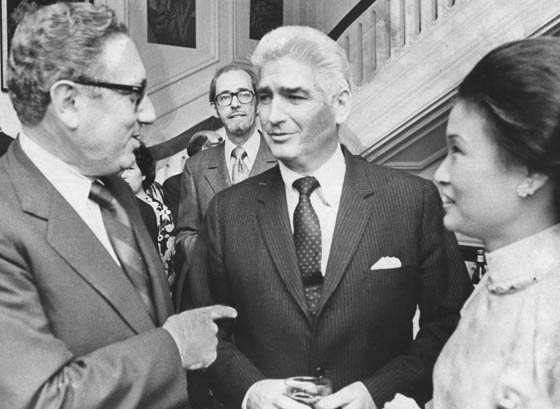William H. Sullivan dies at 90; veteran diplomat was last U.S. ambassador to Iran

William H. Sullivan, a veteran diplomat who oversaw the “secret war” in Laos, later helped negotiate the end of U.S. military involvement in Vietnam and served as the last American ambassador to Iran, died Oct. 11 at the Grand Oaks assisted living facility in Washington. He was 90, AVA Diplomatic reports.The family confirmed the death but did not provide a specific cause.
Known as cool and unflappable under fire, Mr. Sullivan was widely credited with saving dozens of American lives through his astute handling of an attack on the U.S. Embassy in Tehran by heavily armed militants on Feb. 14, 1979 — nearly nine months before the better-known seizure that resulted in the Iranian hostage crisis.
Mr. Sullivan was also renowned for his acerbic wit, and he famously clashed with Zbigniew Brzezinski, then national security adviser to President Jimmy Carter, over Iran policy. Asked by a Brzezinski aide on the phone whether he could arrange a coup against the Iranian revolution, which had just succeeded in toppling the shah of Iran, Mr. Sullivan delivered what he later described as an “unprintable” reply. Told that his comment was unhelpful, he retorted: “Do you want me to translate it into Polish?”
As ambassador to the Philippines earlier in the 1970s, Mr. Sullivan negotiated an extension of leases for military bases there, despite a sometimes testy relationship with Philippine President Ferdinand Marcos and his flighty, extravagant wife, Imelda. When Imelda Marcos once complained that she did not know what else she could do to help the country’s poor, Mr. Sullivan told her: “You could try feeding them cake.”
William Healy Sullivan was born Oct. 12, 1922, in Cranston, R.I., to a dental surgeon and a schoolteacher. After graduating from Brown University in 1943, he joined the Navy and served in the Atlantic, Mediterranean and Pacific during World War II. His ship, the destroyer Hambleton, participated in the D-Day invasion and later in the siege of Okinawa.
Mr. Sullivan earned a joint graduate degree in 1947 from Harvard University and Tufts University’s Fletcher School of Law and Diplomacy. He married a fellow Fletcher student, Marie Johnson, and joined the State Department, beginning a 32-year career in diplomacy that took him all over the world.
During his first assignment, as a consular officer in Bangkok in the late 1940s, he became the embassy’s Indochina expert and made contact with Vietnamese communist guerrillas who were then living in exile in northern Thailand. He was ordered to cease those contacts, but they nevertheless stood him in good stead when he later helped initiate peace talks with the North Vietnamese.
In the interim, Mr. Sullivan served in diplomatic posts in Calcutta and Tokyo, where he was a political adviser to Gen. Douglas MacArthur in post-war Japan. He also had assignments in Rome, The Hague and Saigon.
In 1964, President Lyndon B. Johnson named him ambassador to Laos, which was officially neutral in the conflict in neighboring Vietnam but was fighting its own communist insurgency with clandestine help from the United States.
As ambassador, Mr. Sullivan controlled a secret U.S. bombing campaign against North Vietnamese troops and supplies moving through Laotian territory along the Ho Chi Minh Trail. His power sparked resentment among U.S. military commanders in South Vietnam and led one U.S. senator to describe him as a “military proconsul.”

